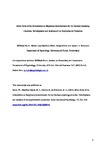Short Form of the Orientations to Happiness Questionnaire for the German-Speaking Countries: Development and analysis of the psychometric properties
| dc.contributor.author | Ruch, W | |
| dc.contributor.author | Martínez-Martí, ML | |
| dc.contributor.author | Heintz, Sonja | |
| dc.contributor.author | Brouwers, SA | |
| dc.date.accessioned | 2020-04-08T21:37:06Z | |
| dc.date.available | 2020-04-08T21:37:06Z | |
| dc.date.issued | 2014-10 | |
| dc.identifier.issn | 1421-0185 | |
| dc.identifier.issn | 1662-0879 | |
| dc.identifier.uri | http://hdl.handle.net/10026.1/15552 | |
| dc.description.abstract |
<jats:p> This paper addresses the development of a 9-item Short Form of the Orientations to Happiness (OTH) Questionnaire ( Peterson, Park, & Seligman, 2005 ) for German-speaking countries. This questionnaire measures three ways to happiness: life of pleasure, life of engagement, and life of meaning. In Experiment 1 (replication sample, N = 1,336), we replicated the three-factor structure found in the 18-item Parent Form. In Experiment 2 (validation sample, N = 222), we again replicated the three-factor structure, which showed a good fit to the data. The coefficients of congruence between the three factors in Experiments 1 and 2 were very high (.94–.98). The correlations between the corresponding scales of the Short and Parent Form were high (.49 – .91). The three scales of the Short Form had acceptable internal consistency. The pattern of relationships of both the OTH Short Form and Parent Form with sociodemographic variables, with the endorsement of prototypical behaviors related to the three orientations to happiness, and with meaning in life were very similar for both OTH forms. </jats:p> | |
| dc.format.extent | 225-234 | |
| dc.language | en | |
| dc.language.iso | en | |
| dc.publisher | Hogrefe Publishing Group | |
| dc.subject | orientations to happiness | |
| dc.subject | positive psychology | |
| dc.subject | well-being | |
| dc.subject | pleasure | |
| dc.subject | engagement | |
| dc.subject | meaning | |
| dc.title | Short Form of the Orientations to Happiness Questionnaire for the German-Speaking Countries: Development and analysis of the psychometric properties | |
| dc.type | journal-article | |
| dc.type | Journal Article | |
| plymouth.author-url | https://www.webofscience.com/api/gateway?GWVersion=2&SrcApp=PARTNER_APP&SrcAuth=LinksAMR&KeyUT=WOS:000342476900004&DestLinkType=FullRecord&DestApp=ALL_WOS&UsrCustomerID=11bb513d99f797142bcfeffcc58ea008 | |
| plymouth.issue | 4 | |
| plymouth.volume | 73 | |
| plymouth.publication-status | Published | |
| plymouth.journal | Swiss Journal of Psychology | |
| dc.identifier.doi | 10.1024/1421-0185/a000141 | |
| plymouth.organisational-group | /Plymouth | |
| plymouth.organisational-group | /Plymouth/Faculty of Health | |
| plymouth.organisational-group | /Plymouth/Faculty of Health/School of Psychology | |
| plymouth.organisational-group | /Plymouth/REF 2021 Researchers by UoA | |
| plymouth.organisational-group | /Plymouth/REF 2021 Researchers by UoA/UoA04 Psychology, Psychiatry and Neuroscience | |
| plymouth.organisational-group | /Plymouth/REF 2021 Researchers by UoA/UoA04 Psychology, Psychiatry and Neuroscience/UoA04 Psychology, Psychiatry and Neuroscience MANUAL | |
| plymouth.organisational-group | /Plymouth/Research Groups | |
| plymouth.organisational-group | /Plymouth/Research Groups/Plymouth Institute of Health and Care Research (PIHR) | |
| plymouth.organisational-group | /Plymouth/Users by role | |
| plymouth.organisational-group | /Plymouth/Users by role/Academics | |
| dcterms.dateAccepted | 2014-06-01 | |
| dc.identifier.eissn | 1662-0879 | |
| dc.rights.embargoperiod | Not known | |
| rioxxterms.versionofrecord | 10.1024/1421-0185/a000141 | |
| rioxxterms.licenseref.uri | http://www.rioxx.net/licenses/all-rights-reserved | |
| rioxxterms.licenseref.startdate | 2014-10 | |
| rioxxterms.type | Journal Article/Review |


